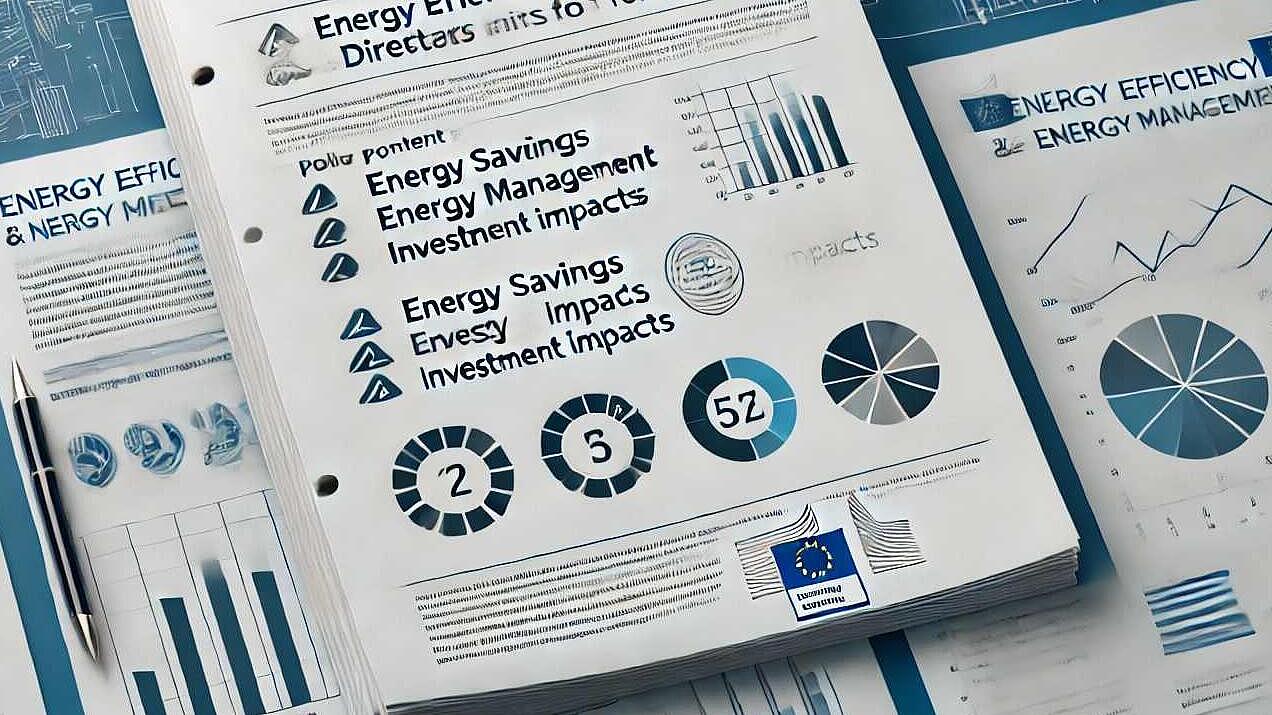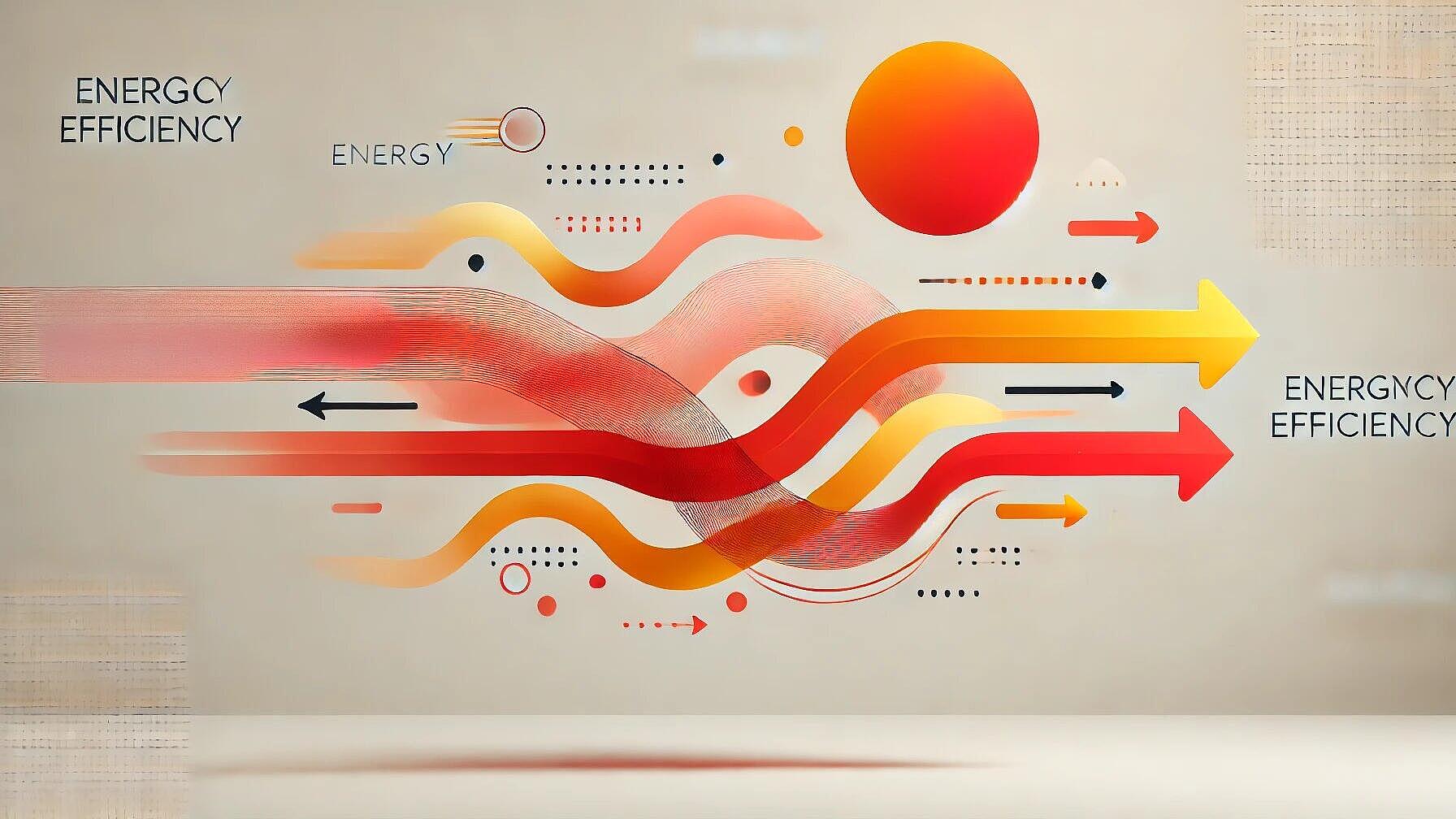 Energy Efficiency
Energy EfficiencyPráticas Comerciais
All you need to know: The EU's bold Energy Efficiency Directive
Resumo
The EU's Directive (EU) 2023/1791 is a critical step in addressing climate change through enhanced energy efficiency. It sets a binding target to reduce energy consumption by at least 11.7% by 2030, with specific goals for both final (763 Mtoe) and primary energy consumption (992.5 Mtoe). Member States are tasked with developing national indicators contributing to these targets, employing a standardized methodology that considers several factors. To ensure collective efforts meet EU-wide objectives, the Directive allows the Commission to revise national contributions if necessary.
The public sector is pivotal in this initiative, mandated to reduce energy consumption by 1.9% annually. Moreover, 3% of public bodies' building floor areas must be renovated yearly to meet energy efficiency standards. Public procurement policies are now required to prioritize energy-efficient options.
Within the building sector, responsible for 40% of EU's energy consumption, the Directive mandates more stringent renovation standards and measures to alleviate energy poverty. The industry sector must also conduct energy audits and establish energy management systems, particularly for large enterprises, to identify energy-saving opportunities.
The Directive focuses on optimizing heating and cooling systems, including comprehensive assessments and the adoption of efficient district systems that must use renewable energy or waste heat by 2050. New regulations are introduced for industrial and commercial waste heat utilization.
Consumer empowerment and protection against energy poverty are addressed through improved energy billing transparency and the establishment of consumer rights regarding energy services. Member States must ensure energy efficiency measures do not negatively impact vulnerable populations.
For effective implementation, the Directive demands detailed national energy action plans, progress reporting, and compliance monitoring. The European Commission holds enforcement capabilities, including recommendations and infringement proceedings if Member States do not fulfill obligations.
In conclusion, the Directive aims to bring about significant advances in energy efficiency across the EU, ensuring consumer empowerment, social equity, and adherence to climate goals. Its implementation is expected to stimulate innovation, business opportunities, and establish the EU as a leader in sustainable energy use.
Artigo aberto completo
All you need to know: The EU's bold Energy Efficiency Directive
The European Union has taken a major step forward in its fight against climate change with the adoption of Directive (EU) 2023/1791 on energy efficiency. This comprehensive legislation aims to dramatically improve energy efficiency across all sectors of the economy, from buildings and industry to transportation and public services. By setting ambitious targets and implementing wide-ranging measures, the EU is positioning itself as a global leader in sustainable energy use and carbon reduction.
Setting Ambitious Targets
The cornerstone of the new directive is its establishment of binding energy efficiency targets for 2030. The EU has committed to reducing energy consumption by at least 11.7% compared to 2020 projections, with the goal of limiting final energy consumption to no more than 763 million tonnes of oil equivalent (Mtoe). An indicative target for primary energy consumption of 992.5 Mtoe has also been set.
To achieve these goals, each Member State must set its own indicative national energy efficiency contribution. The directive provides a formula and methodology for calculating these contributions, taking into account factors such as energy intensity, GDP, and cost-effective energy savings potential. Importantly, the Commission has the power to issue corrected contributions if Member States' collective efforts fall short of the EU-wide target.
Empowering the Public Sector
Recognizing the importance of leadership by example, the directive places significant emphasis on improving energy efficiency in the public sector. All public bodies are required to reduce their final energy consumption by at least 1.9% each year, starting from 2021. This applies to all levels of government, from national ministries to local municipalities.
One of the most notable requirements is that Member States must ensure at least 3% of the total floor area of heated and/or cooled buildings owned by public bodies is renovated each year to meet high energy efficiency standards. This renovation obligation will drive significant improvements in the energy performance of public buildings across the EU.
The directive also mandates that public procurement take energy efficiency into account. When purchasing products, services, buildings, and works, public bodies must prioritize energy-efficient options that meet certain minimum criteria.
Transforming Buildings and Industry
Buildings account for 40% of the EU's energy consumption, making them a critical focus area for efficiency improvements. The directive strengthens requirements for the renovation of existing buildings and sets new standards for new construction. It also emphasizes the importance of addressing energy poverty, with Member States required to implement measures to improve the energy efficiency of households affected by energy poverty.
In the industrial sector, the directive introduces new obligations for energy audits and energy management systems. Large enterprises must implement certified energy management systems, while medium-sized enterprises are required to undergo regular energy audits. These measures will help identify and realize significant energy savings in industrial processes.
The directive also promotes the use of energy performance contracting and other innovative financing mechanisms to overcome barriers to energy efficiency investments in both buildings and industry.
Advancing Efficient Heating and Cooling
Recognizing the significant energy consumption and potential for improvement in heating and cooling systems, the directive places strong emphasis on this sector. It requires Member States to carry out comprehensive assessments of their heating and cooling potentials and to implement measures to realize identified efficiency opportunities.
The directive promotes the development of efficient district heating and cooling systems, setting increasingly stringent criteria for what qualifies as an "efficient" system. By 2050, such systems must use only renewable energy or waste heat. This will drive a major transformation in how buildings are heated and cooled across the EU.
Additionally, the directive introduces new requirements for the utilization of waste heat from industrial and commercial facilities, including data centers. This will help capture and make use of a significant energy resource that is currently often wasted.
Empowering Consumers and Addressing Energy Poverty
A key aspect of the directive is its focus on empowering consumers to make informed decisions about their energy use. It strengthens requirements for energy billing and consumption information, ensuring that consumers have access to accurate, timely, and comprehensible data about their energy usage.
The directive also introduces new consumer rights related to heating, cooling, and domestic hot water services. These include requirements for clear contracts, easy-to-understand billing, and the right to basic contractual information.
Importantly, the legislation places significant emphasis on addressing energy poverty. Member States are required to implement targeted measures to improve energy efficiency among vulnerable households and to ensure that energy efficiency policies do not adversely affect those at risk of energy poverty.
Implementing and Enforcing the Directive
The successful implementation of this ambitious directive will require concerted effort from all Member States. The legislation sets out detailed requirements for national energy efficiency action plans, progress reporting, and monitoring of implementation.
The directive also empowers the European Commission to take action if Member States fall short of their obligations. This includes the ability to issue recommendations, require additional measures, and potentially initiate infringement proceedings.
To support implementation, the directive promotes the development of financing mechanisms, technical assistance programs, and capacity-building initiatives. It also emphasizes the importance of collaboration between different levels of government and with the private sector to achieve energy efficiency goals.
Conclusion
Directive (EU) 2023/1791 represents a significant leap forward in the EU's energy efficiency policy. By setting ambitious targets, implementing comprehensive measures across all sectors, and emphasizing the importance of consumer empowerment and social equity, the legislation provides a robust framework for transforming energy use across the European Union.
As Member States begin the process of transposing and implementing this directive, it will drive innovation, create new business opportunities, and contribute significantly to the EU's climate and energy goals. The success of this directive will be crucial in positioning the EU as a global leader in the transition to a sustainable, low-carbon future.
If you want to know more, read the full report here.
This is article and the underlying reports provides the answers to the EENOVA quiz from EnerWhizz
- 5 questions in 45 seconds
- win prizes
- TOP50 win
The EENOVA quiz is part of the EU project EENOVA - more here



